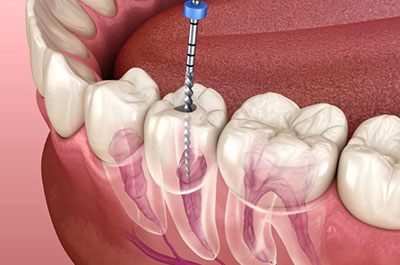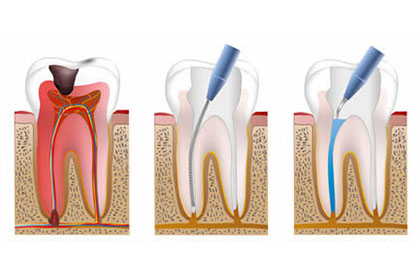Looking for a root canal treatment specialist in Addis Ababa ? We can help. Call our dental clinic in Addis Ababa to schedule an appointment and get treated by our certified endodontists.
Call us to request a root canal treatment at our dental clinic in Addis Ababa
What is endodontics?
Frequently performed by your dentist, endodontic treatment (also called root canal treatment or root canalization) consists of treating the internal part of the tooth, the pulp, when it is affected (decay, fracture, necrosis…).
It is the most appropriate solution to preserve the tooth. Pulp damage can cause a lot of tooth pain and, if left untreated, can lead to the development of a dental abscess.
Related content : Top dentists in Addis Ababa, Ethiopia
Root canal treatment consists of removing the pulp, the living part of the tooth, disinfecting the entire internal canal system of the tooth, widening the main canals and filling them with a filling material to seal them.
The tooth will then need to be restored by your dentist, the nature of which will depend on the cause of the root canal, the extent of the loss of substance and the post-operative prognosis.
Related : Open dental clinic in Addis Ababa
What is the purpose of a root canal treatment
 In the absence of a root canal treatment, tooth extraction will have to be the last resort for your dentist to drain and eliminate the infection from your tooth while eliminating the risk of spreading.
In the absence of a root canal treatment, tooth extraction will have to be the last resort for your dentist to drain and eliminate the infection from your tooth while eliminating the risk of spreading.
Your dentist will always recommend this type of treatment rather than extraction when possible, regardless of the intensity of the pain and the extent of the lesion.
In fact, even if your tooth is devitalized, it still performs many functions: chewing with satisfactory efficiency, maintaining the position of your teeth in relation to each other and finally preserving the jawbone around it, the alveolar bone.
What are the indications for a root canal treatment?
Following the clinical examination during your dental consultation, your dentist will recommend an endodontic treatment (root canal) in the following situations :
- Your tooth has a very deep cavity that has affected the pulp inside your tooth
- Your tooth has an irreversible pulpitis, (it is a victim of an inflammation that only a devitalization will be able to relieve),
- Your tooth is necrotic,
- Your tooth has lost too much substance, making a prosthetic treatment necessary, which requires the devitalization of your tooth.
How is the root canal treatment performed by the dentist?
Endodontic treatment is a treatment frequently performed by an endodontist.
As for any dental treatment, its indication will be established during the dental consultation with the help of a meticulous clinical examination of the affected tooth, a clinical examination completed by a radiological examination.
The root canal treatment is painless because it is always performed under local anesthesia, even if your tooth is necrotic.
This procedure includes a precise operating protocol followed by your dentist, which is described below :
- Anesthesia of the tooth (anesthesia varies depending on the tooth and the arch)
- Protection of the tooth by placing a dam around it
- Opening of the tooth to access the inner part to be treated
- Removal of carious tissue or sharp edges in case of fracture
- Cleaning, disinfection and mechanical preparation of the pulp cavity and canals
- Filling of the canals with gutta percha cones and antiseptic paste
- Closure of the tooth with a temporary filling.
- Orientation of the treatment towards the realization of a definitive care.
In certain situations, your dentist will qualify the endodontic treatment to be performed as ” advanced “.
This will be the case in particular :
- If your tooth has a poor prognosis for conservation (too much loss of substance, unfavorable crown/root ratio, etc.),
- If your tooth is a wisdom tooth and has a periapical abscess,
- If your tooth and its roots have many accessory canals,
- If the canals of your tooth are calcified,
- If your tooth has root resorption,
- If you have a general pathology that contraindicates the conduct of an endodontic treatment
Following root canal treatment by your dentist, it is quite common to experience post-operative pain.
Your tooth, devitalized, is not responsible for the pain.
The pain is caused by a local and temporary inflammation of the tissues supporting your tooth.
Your dentist will prescribe painkillers and will recommend that you do not put too much pressure on the tooth.
The pain usually subsides after one to three days.
If your tooth was previously infected, the prescription of painkillers will be completed by a prescription of antibiotics.
Tooth restoration after endodontic treatment
After endodontic treatment, a permanent tooth restoration is performed by your dentist.
There are many treatment options : classic fillings (composites or amalgams), indirect restoration techniques (inlay-onlay) or prosthetics (dental crown, false stump covered with a dental crown…).
The choice will be oriented mainly by the cause of the devitalization and the loss of substance.
Indeed, once devitalized, your tooth “tends” to be more “fragile” on the one hand because of the loss of vitality and on the other hand because of the fragility linked to the loss of substance.
This is why most of the permanent restorations are made of dental crowns; indeed, the permanent reconstruction by a crown allows to “strengthen” your tooth and to ensure a real watertightness in time to your endodontic treatment.
Schedule a root canal treatment now with an endodontist in our dental clinic in Addis Ababa.


